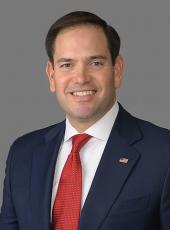
Rubio Campaign Press Release - Ted Cruz Is Proposing a Huge New Tax That Will Hit the Middle Class

A new analysis from a left-leaning think tank claims that Marco's pro-growth, pro-family tax plan, which cuts taxes for families and businesses, contains a form of a value-added tax (VAT).
This is a notable claim — and a wildly misleading one — because numerous conservatives have criticized Ted Cruz's plan for including a value-added tax, on the grounds that it's a hidden mechanism to grow government as European countries have, a new tax on the middle class, and a levy that would hit previously untaxed portions of the economy.
The problems with Cruz's plan are significant, so it's important to understand why they don't apply to Marco's plan at all.
Some of the key differences between Marco's plan and Cruz's plan:
- Cruz stacks a new tax — the VAT — on top of our existing income tax. Marco cuts the existing income tax in a way that will spark economic growth.
- Cruz's plan taxes wages and wealth — hurting retirees, employees of charities and churches, and home sales. Marco's does not.
- Cruz's VAT is totally hidden from those who pay it: the American people. In fact, it is deliberately less transparent than VATs in many European countries. This is troubling because it makes it easier for politicians to raise taxes with no accountability. Marco's plan cuts taxes for all Americans in a transparent manner and does not include any new taxes.
- Cruz's VAT would, contra his promise to abolish the IRS, likely require tens of thousands of new IRS agents to enforce it. Marco's plan works within the existing system and wouldn't grow government.
Those are just few of the most important differences between two plans.
Rubio tax cut vs. Cruz VAT pic.twitter.com/Bz6WkbMwZ7
— Phillip Swagel (@pswagel) February 11, 2016
Conservative tax expert Ryan Ellis said the liberal think tank's report is grossly misleading:
There is only one candidate running on a VAT plan this year. His name is Ted Cruz, not Marco Rubio. There are major, major differences between a VAT and a business cash flow profits tax (Rubio's method). Yet report author Len Burman has apparently confused the Washington Post, Politico, and the Washington Examiner by telling them that the two taxes are, to use Burman's term, "effectively" the same (the Wall Street Journal didn't buy it).
They are very much not the same, as any tax expert will tell you. The biggest difference is that Rubio's business profits tax allows wages and other compensation to be deductible, but Cruz's VAT does not. That's a very big deal, and it's not the only distinction between the two. To inject confusion into what has become a hot policy conflict between the two is not appropriate.
Marco proposes to cut both individual and business income tax rates across the board — and his plan creates no new taxes. It allows the immediate expensing of business investment, a longtime conservative priority for tax reform that would boost economic growth and investment and help businesses large and small.
Many economists see that second change as having the effect of turning the U.S.'s current income tax into a consumption tax — considered by most economists to be a pro-growth reform. That's why Marco proposed the plan he did.
But this kind of reform is nothing like the harmful VAT contained in Cruz's plan. While Marco's plan would encourage investment and spur growth, the VAT in the Cruz plan would enact a new, hidden tax on a much larger tax base than we have today — so much bigger that over 70 percent of the revenue raised in Cruz's plan comes from his VAT.
Liberal economists might want a new tax on the American people like a VAT to help them pay for big government, but that will never happen when Marco is president.
US corp taxes are so high that companies are going overseas. @marcorubio wants to lower taxes and encourage investment. This is not a VAT.
— Diana Furchtgott-R (@FurchtgottRoth) February 11, 2016
The group that's muddled the waters about Marco's plan, the Tax Policy Center, is not a neutral arbiter and is biased against pro-growth plans. After the TPC deliberately misrepresented Mitt Romney's tax plan in 2012, the Wall Street Journal editorial board called the group "the intellectual frontmen for President Obama's re-election campaign," noting they "claim to be nonpartisan, above-the-fray economists but somehow always seem to provide analysis that serves those who want to raise tax rates." Even the federal government, through the Congressional Budget Office and the Joint Committee on Taxation use dynamic scoring, but the TPC still does not, inflating the amount of lost revenue from any pro-growth tax reform, including Marco's plan. And that isn't the end of the problems: The TPC also makes inaccurate assumptions that lead them to understate the tax relief Marco's plan provides for low-income workers.
The Bottom Line
Marco's plan transforms the federal tax system to make it work for American families and businesses, cuts their taxes significantly, and dramatically simplifies the tax code.
Cruz's plan adds a new, hidden tax on wages and hide the cost of government from the American people. That's all you need to know.
Marco Rubio, Rubio Campaign Press Release - Ted Cruz Is Proposing a Huge New Tax That Will Hit the Middle Class Online by Gerhard Peters and John T. Woolley, The American Presidency Project https://www.presidency.ucsb.edu/node/326061
